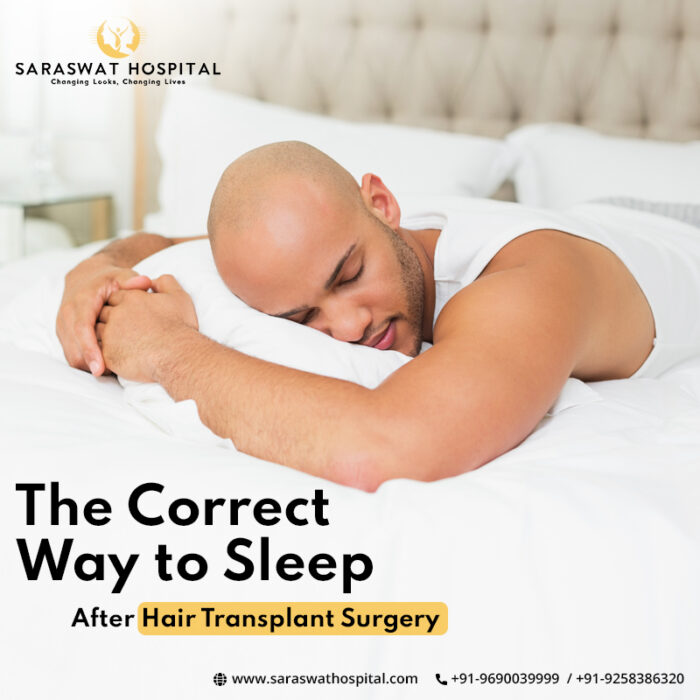Modern-day hair transplant surgeries are minimally invasive and an outpatient procedure where the patient is free to go home after the operation. If you choose the no. 1 hair transplant clinic in India, you get a safe, more effective surgery that leaves natural-looking results and a quicker healing process. However, from your end, the one thing that you would have to do to ensure that the recovery process is smooth is to maintain all the post-treatment instructions given to you by the professionals. One of the most important aspects of recovery is understanding the correct way to sleep after hair transplant surgery. Sleeping improperly can disrupt the healing process, damage newly transplanted grafts, or lead to complications. This blog will guide you through the best practices for sleeping after a hair transplant, ensuring optimal results.
Why Sleeping Position Matters After a Hair Transplant
After a hair transplant, the scalp is highly sensitive, and the newly implanted hair follicles are delicate. Incorrect sleeping positions can cause pressure, friction, or swelling, which may dislodge grafts or hinder healing. Proper sleep posture helps:
Protect the grafts: Ensures the transplanted follicles remain secure.
Minimize swelling: Reduces fluid buildup in the scalp or face.
Promote healing: Allows proper blood circulation to the scalp.
Prevent discomfort: Reduces irritation or pain in the treated area.
By following the correct way to sleep after hair transplant surgery, you can significantly improve your recovery and the overall outcome of the procedure.
The Correct Way to Sleep After Hair Transplant Surgery
Here are the key guidelines to ensure you sleep correctly during the recovery phase:
1. Sleep with Your Head Elevated
For the first 7-10 days after surgery, it’s crucial to sleep with your head elevated at a 45-degree angle.
2. Sleep on Your Back
The correct way to sleep after hair transplant is on your back, with your head facing upward.
3. Use a Clean, Soft Pillowcase
Hygiene is critical after a hair transplant to prevent infection. Use a clean, soft pillowcase made of cotton or a similar breathable material.
4. Avoid Touching the Transplanted Area
While sleeping, you may unconsciously touch or scratch your scalp. To prevent this:
- Keep your hands clean and avoid touching the scalp unnecessarily.
- Consider wearing a loose, breathable head covering (if recommended by your surgeon) to protect the area.
- Use a neck pillow to limit head movement during sleep.
5. Follow Your Surgeon’s Instructions
Every hair transplant procedure is unique; therefore, your surgeon will provide specific guidelines based on the technique used, such as FUE or FUT, and your individual case. Consequently, you should always prioritize their advice to ensure the correct way to sleep after hair transplant surgery.
Tips for Better Sleep Post-Hair Transplant
- Stay hydrated: Drink plenty of water to support overall healing.
- Avoid alcohol and smoking: These can impair blood flow and slow recovery.
- Use prescribed medications: Take any prescribed painkillers or anti-inflammatory drugs to manage discomfort and help you sleep better.
- Maintain a calm sleep environment: Keep your bedroom cool, quiet, and dark to promote restful sleep without disturbances.
Additional Tips to Sleep after a Hair Transplant Procedure
The recovery period, after undergoing hair loss treatment in Agra, is typically unproblematic as you maintain a thorough aftercare routine. The one common concern that most people share about the same, however, remains the best position to sleep in to ensure no hair follicles get damaged. You will have to ensure that there is no added pressure to the newly implanted follicles so that they can grow at their natural rate without any problem. If there is any pressure on the follicles, there is a high chance of you ending up with a botched-up transplant result. Now, let’s find out the top things you need to take care of as you go to sleep after the procedure:
Choose the Right Position
At least for a week after the surgery, you need to ensure that you sleep with your back and head slightly elevated above the rest of your body. The first few nights have the highest risk of swelling, and the elevation would speed up the recovery process. In case you are lying on your back, keep your head on top of a soft pillow, and try not to toss or turn much during sleep.
Maintain Cleanliness
Since you are undergoing a procedure on your scalp, you need to be extra careful with the way you clean your sheets, pillowcases, and even your bed to avoid any infection or other risks to the incision sites. To ensure that your scalp doesn’t get irritated or too sweaty, use comfortable materials for your sheets and pillowcases, and always wash them with a detergent that doesn’t have allergens.
Cover the Pillow with a Towel
In the post-operative phase, you might find some leakage from the scalp on the pillow or sheets. As you cover your pillow with a cloth or a soft towel, you can rest assured that the bedding won’t be spoiled by stains from the leakage.
As you undergo a hair transplant in Agra, you may have to wait for around 10 days before returning to your normal activities or routines. This is because the hair grafts and incisions require a minimum of 7 days to heal once operated on. To be on the safer side, however, you can give around 14 days for the newly transplanted grafts to be securely rooted to the recipient site before you move on to resuming your normal routine.
Why Should You Visit ABHRS Certified Experts for the Hair Transplant?
Saraswat Hospital, as the no. 1 hair transplant clinic in India offers both FUT and FUE hair transplant surgery, along with repair hair transplant and even celebrity hair transplant treatments. The doctors leading the hospital have over 20+ years of experience in the field and certification from the American Board of Hair Restoration Surgery (ABHRS) as well.
Dr Satya Kumar Saraswat is a Gold Medalist Plastic Surgeon who has degrees such as MBBS, MS, M.Ch., and DNB to his credit. He specializes in plastic and cosmetic surgery procedures that include cleft lip, palate, and hair restoration techniques. He is one of the highly sought-after doctors in India who performs the UGraft™ punch method according to patient requirements during hair transplant surgeries.
Dr Preeti Saraswat is an MBBS with a PGDCC degree from the University of Greifswald, Germany. She is known for the scalp micropigmentation treatments that she has been rendering to her patients over the years. She is also a member of the American Academy of Aesthetic Medicine (AAAM).
Conclusion
Mastering the correct way to sleep after hair transplant surgery is a vital part of ensuring a successful recovery and achieving the best possible results. One of the most important things that you would have to note about undergoing a hair transplant surgery is visiting an experienced doctor for the procedure. This would ensure that you have a qualified team of experts looking after your recovery time, thereby giving you the desired results. Saraswat Hospital has a team of professionals skilled to take care of your after-hair-transplant requirements. To book an appointment with the doctors, get in touch with Saraswat Hospital today.


